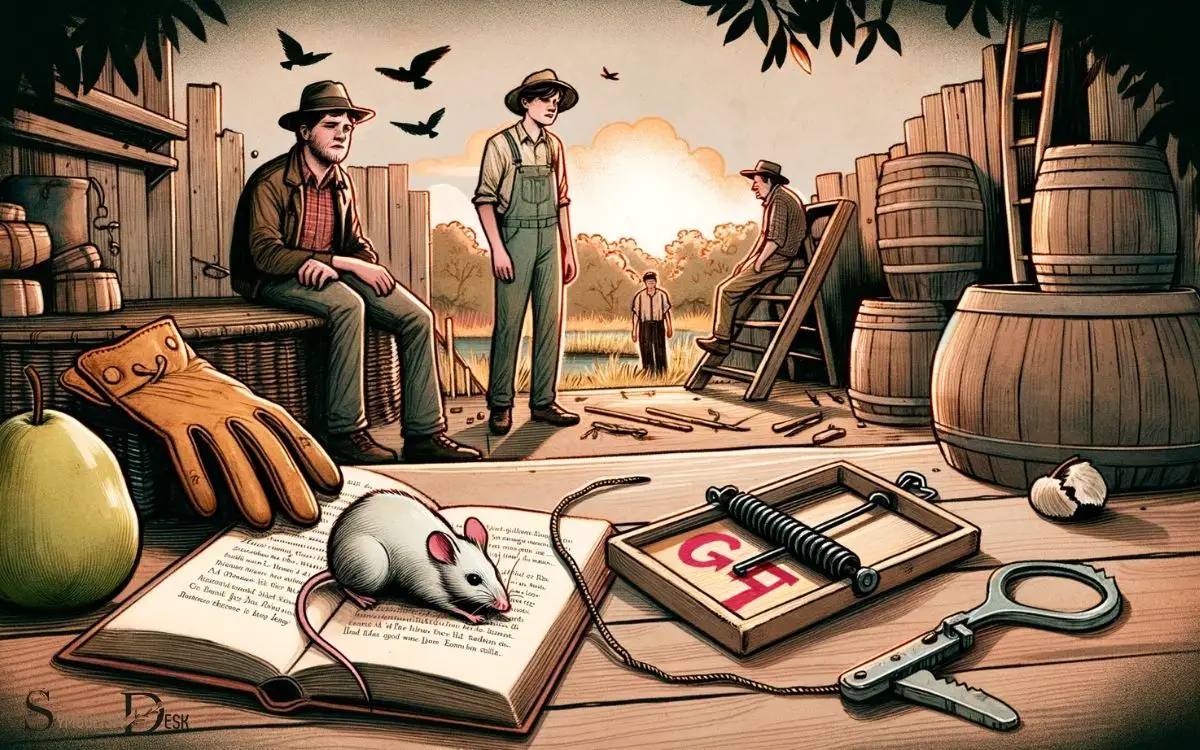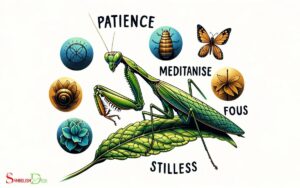Of Mice And Men Symbolic Character Names: Hope!
In John Steinbeck’s classic novella ‘Of Mice and Men,’ character names are more than mere labels; they are imbued with symbolic meanings that enhance the reader’s understanding of key themes such as hope, struggle, and companionship.
George and Lennie’s names, for instance, hint at their complex relationship and individual personas, while names like Curley and Slim provide insights into their respective roles within the story.
By delving into the symbolism behind the characters’ names, one gains a more profound appreciation of Steinbeck’s literary craft and the societal reflections within the narrative.
The symbolic significance of character names in ‘Of Mice and Men’ includes:
- George Milton: His last name nods to the poet John Milton, suggesting depth and thoughtfulness.
- Lennie Small: Despite his large size, ‘Small’ indicates his mental limitations and vulnerability.
- Curley: The name implies a sense of trying to appear stronger or more formidable than he is.
- Slim: Connotes respect and competence; Slim is seen as the moral compass of the group.
- Candy: Reflects the character’s elderly and ‘sweet’ nature but also hints at his disposability.
- Crooks: Named for his crooked back, symbolizing the physical and social bends under the weight of racism.
By using these names, Steinbeck not only describes his characters but also encapsulates their essence and the broader human condition they represent.
Steinbeck’s careful naming enhances ‘Of Mice and Men,’ revealing the hopes and hardships of each character.

Key Takeaway
5 Character Name of Mice And Men
| Character Name | Symbolic Meaning |
|---|---|
| George | Represents the idea of companionship and protection. |
| Lennie | Symbolizes innocence and vulnerability. |
| Curley | Signifies aggression and conflict. |
| Candy | Represents the fragility of dreams and aging. |
| Slim | Symbolizes wisdom, strength, and stability. |
George and Lennie: The Power of Friendship
The friendship between George and Lennie in ‘Of Mice and Men’ serves as a powerful symbol of companionship and mutual support. Their relationship is emblematic of the universal human longing for connection and understanding.
George’s protective instincts and Lennie’s unwavering loyalty create a profound bond that transcends their challenging circumstances. Steinbeck masterfully uses their friendship to explore themes of loneliness, marginalization, and the inherent human need for companionship.
Through their interactions, the novel delves into the complexities of dependence and independence, shedding light on the delicate balance between individuality and interconnectedness.
The dynamic between George and Lennie serves as a poignant reminder of the intrinsic value of empathy and solidarity in a world fraught with isolation and adversity.
Their enduring friendship resonates as a timeless testament to the redemptive power of genuine human connection.
Curley: The Aggressive Small Man
Named Curley, the character embodies aggression and insecurity, serving as a stark contrast to the friendship between George and Lennie.
Despite his small stature, Curley compensates for his physical size through his aggressive behavior, constantly seeking confrontation as a way to assert his dominance.
His insecurity is evident in his need to prove his masculinity and control, particularly through his possessive attitude towards his wife.
This aggression and insecurity are perhaps a result of his own feelings of inadequacy, driving him to constantly assert his authority over others.
Curley’s character serves as a symbol of the toxic masculinity and power dynamics prevalent during the Great Depression era, adding depth to the novel’s exploration of human nature and societal norms.
Slim: The Idealized Man
Exemplifying qualities of wisdom and strength, Slim stands as the embodiment of an idealized man in ‘Of Mice and Men.’ His name itself suggests a lean and efficient character, reflecting his role as a moral authority and a voice of reason on the ranch.
Here is a comparative analysis of Slim’s character traits:
| Trait | Explanation |
|---|---|
| Wisdom | Serves as a source of insight and guidance for other characters. |
| Compassion | Shows empathy and understanding towards the struggles of others. |
| Leadership | Commands respect and is looked upon as a natural leader. |
| Integrity | Demonstrates honesty and fairness in his actions and decisions. |
| Strength | Both physical and emotional, providing stability in times of turmoil. |
Slim’s symbolic significance as the idealized man is crucial in understanding the deeper thematic elements of Steinbeck’s novel.
Candy: The Fragility of Old Age
Representing the fragility of old age, Candy’s character in ‘Of Mice and Men’ serves as a poignant portrayal of the challenges faced by the elderly.
Through Candy, Steinbeck illuminates the harsh realities of aging, depicting the vulnerability and sense of powerlessness that often accompany advanced years.
Candy’s physical limitations, resulting from the loss of his hand, symbolize the diminishing strength and capabilities of the elderly, while his emotional dependence on his aging dog reflects the loneliness and attachment that can characterize old age.
Additionally, Candy’s fear of being rendered useless and discarded, as seen in his desperate plea to be included in George and Lennie’s dream of owning a farm, highlights the pervasive feeling of irrelevance that can haunt the elderly.
Ultimately, Candy’s character serves as a poignant reminder of the fragility and challenges inherent in old age.
How are the symbolic character names in “Of Mice and Men” related to cultural symbolism in literature?
The symbolic character names in “Of Mice and Men” are related to cultural symbolism in literature. The names of characters such as Lennie Small and Curley have deeper meanings that reflect the themes of the novel and are often used to convey deeper messages in symbolic character names literature.
How does the symbolic meaning of a sparrow relate to the symbolic character names in Of Mice and Men?
The symbolic meaning of sparrow represents freedom and resilience, which mirrors the characters in Of Mice and Men. Lennie Small embodies innocence and vulnerability, akin to a fragile sparrow. George Milton symbolizes strength and protection, reminiscent of the sparrow’s ability to adapt and survive.
Crooks: The Symbol of Racial Injustice
In John Steinbeck’s ‘Of Mice and Men,’ Crooks, the sole African American character, represents the pervasive racial discrimination and social exclusion experienced during the Great Depression.
His symbolic significance is evident through various aspects of his characterization:
- Physical Segregation: Crooks is forced to live in a separate bunkhouse due to his race, highlighting the segregation and isolation faced by African Americans.
- Emotional Alienation: He endures constant loneliness and is denied basic human connections, reflecting the emotional toll of racial prejudice.
- Economic Disempowerment: Crooks holds a marginalized position on the ranch, illustrating the economic inequality and limited opportunities for people of color.
- Legal Injustice: When threatened with false accusations, Crooks expresses fear of unfair treatment by the law, exemplifying the systemic racial bias in the justice system.
- Internalized Oppression: His guarded demeanor and cynicism reveal the internalization of societal racism, depicting the psychological impact of discrimination.
Crooks’ character serves as a poignant symbol of the racial injustices prevalent during that era, shedding light on the harsh realities faced by African Americans.
Conclusion
In Steinbeck’s ‘Of Mice and Men,’ the symbolic character names serve as a reflection of the deeper themes and social issues present in the novel.
Through the power of friendship depicted by George and Lennie, the aggression of Curley, the idealized figure of Slim and the racial injustice embodied by Crooks, the characters become symbols that highlight the complexities of human experience and societal challenges.







